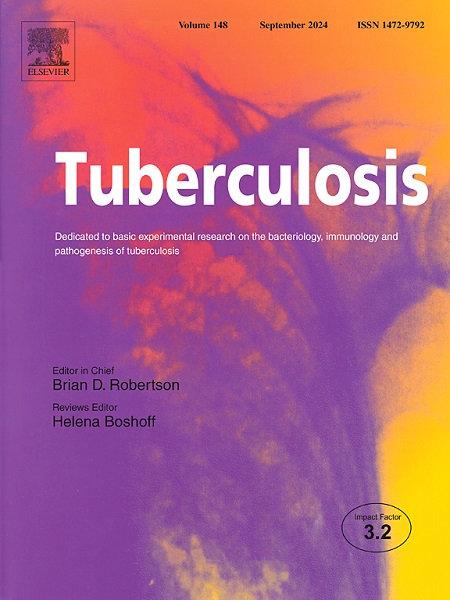Gut bacterial diversity in bovines infected with Mycobacterium tuberculosis var. bovis: insights on tuberculosis pathogenesis
IF 2.9
3区 医学
Q3 IMMUNOLOGY
引用次数: 0
Abstract
Bovine tuberculosis susceptibility and pathogenesis are influenced by host immunity, which may be modulated by the host microbiota. While intestinal microbiota composition affects pulmonary diseases in humans, its role in bovine tuberculosis remains unclear. This study explores the intestinal microbiota of cattle and its association with tuberculosis to better understand disease pathophysiology. A case-control study was conducted using small intestine content samples from cattle with and without tuberculosis, slaughtered in Rio Grande do Sul, Brazil. DNA extraction, 16S rRNA (V4) sequencing, and bioinformatics analyses assessed alpha and beta diversity, taxa characterization, differential abundance, and metabolic pathways. No significant differences in alpha and beta diversities between the groups were detected. However, the Bacillota/Bacteroidota ratio suggested dysbiosis associated with bovine tuberculosis. Differential abundance analysis showed that microorganisms belonging to the Bacillota phylum, the Eubacterium cellulosolvens group, Colidextribacter and Coprococcus genera were enriched in healthy cattle. Conversely, animals with tuberculosis showed higher abundances of Verrucomicrobiota phylum, Sphingomonadaceae and Eubacteriaceae families, and Solobacterium and Clostridia-UCG-014 genera. Moreover, metabolic pathways related to carbohydrate degradation were enriched in healthy animals, and biosynthetic pathways related to disease were enriched in tuberculosis animals. This study highlights associations between intestinal microbiota and bovine tuberculosis, providing insights into disease mechanisms.
牛结核分枝杆菌感染的肠道细菌多样性:对结核病发病机制的见解
牛结核病的易感性和发病机制受宿主免疫的影响,宿主免疫可能受宿主微生物群的调节。虽然肠道菌群组成影响人类肺部疾病,但其在牛结核病中的作用尚不清楚。本研究探讨了牛的肠道微生物群及其与结核病的关系,以更好地了解疾病的病理生理。对巴西南大德州里约热内卢屠宰的患有和未患结核病牛的小肠内容物样本进行了病例对照研究。DNA提取、16S rRNA (V4)测序和生物信息学分析评估了α和β多样性、分类群特征、差异丰度和代谢途径。组间α和β多样性无显著差异。然而,芽孢杆菌/拟杆菌的比例表明与牛结核病相关的生态失调。差异丰度分析表明,健康牛体内富集了杆菌门、纤维素溶剂真杆菌群、Colidextribacter和Coprococcus属的微生物。相反,结核动物的Verrucomicrobiota门、Sphingomonadaceae和Eubacteriaceae以及Solobacterium和clostridium - ucg -014属的丰度较高。此外,与碳水化合物降解相关的代谢途径在健康动物中丰富,与疾病相关的生物合成途径在结核病动物中丰富。这项研究强调了肠道微生物群与牛结核病之间的联系,为疾病机制提供了见解。
本文章由计算机程序翻译,如有差异,请以英文原文为准。
求助全文
约1分钟内获得全文
求助全文
来源期刊

Tuberculosis
医学-呼吸系统
CiteScore
4.60
自引率
3.10%
发文量
87
审稿时长
49 days
期刊介绍:
Tuberculosis is a speciality journal focusing on basic experimental research on tuberculosis, notably on bacteriological, immunological and pathogenesis aspects of the disease. The journal publishes original research and reviews on the host response and immunology of tuberculosis and the molecular biology, genetics and physiology of the organism, however discourages submissions with a meta-analytical focus (for example, articles based on searches of published articles in public electronic databases, especially where there is lack of evidence of the personal involvement of authors in the generation of such material). We do not publish Clinical Case-Studies.
Areas on which submissions are welcomed include:
-Clinical TrialsDiagnostics-
Antimicrobial resistance-
Immunology-
Leprosy-
Microbiology, including microbial physiology-
Molecular epidemiology-
Non-tuberculous Mycobacteria-
Pathogenesis-
Pathology-
Vaccine development.
This Journal does not accept case-reports.
The resurgence of interest in tuberculosis has accelerated the pace of relevant research and Tuberculosis has grown with it, as the only journal dedicated to experimental biomedical research in tuberculosis.
 求助内容:
求助内容: 应助结果提醒方式:
应助结果提醒方式:


